Hate Crimes
Hate crimes can be traumatic for victims and the larger community. That is why the Salt Lake City Police Department committed itself to taking immediate action upon learning of a possible hate crime. The department has dedicated investigative steps to ensure these cases are investigated and to ensure victims are provided support and medical attention.
It is the responsibility of law enforcement to investigate potential hate crimes. Once an investigation is completed, the investigation is submitted to the district attorney’s office for prosecution consideration. The Salt Lake City Police Department believes it is imperative that to stop future hate crimes from occurring, there must be education and enforcement.
Your safety is our number one priority. If you believe you have been the victim of a hate crime, or you know someone who has been the victim of a hate crime, please call 801-799-3000 to report it or to speak with a victim advocate.
Below are some frequently asked questions regarding hate crimes and the Salt Lake City Police Department.
No. Free speech refers to the right of individuals to express their opinions and ideas without censorship, restraint, or fear of punishment from the government. This right is protected under the First Amendment of the United States Constitution and is considered a fundamental principle of democracy.
A hate crime, on the other hand, refers to a criminal act motivated by prejudice or hatred. Hate crimes can take many forms, including physical assault, vandalism, and verbal harassment, and are often intended to intimidate and terrorize not only the victim, but also the larger community to which the victim belongs.
As a police department, we recognize our responsibility to investigate hate crimes thoroughly and impartially to hold offenders accountable and ensure justice for victims.
We start with training. Our officers are trained to recognize hate crimes and understand the various forms they can take, including physical assault, verbal harassment, and property damage. Officers are highly trained in evidence documentation and preservation.
Throughout any hate crime investigation, the Salt Lake City Police Department works with victims and community organizations to establish a rapport with the impacted parties and provide support and resources to those affected by hate crimes.
If you are the victim of a hate crime or witness a hate crime, it is important to report it to the appropriate authorities so the case can be investigated and support and resources offered.
• Call 9-1-1: If the crime is in-progress or there is an immediate threat to the safety of yourself or others.
• File a police report by calling 801-799-3000 and asking to speak with an officer about filing a hate crime report.
• Request assistance from an SLCPD Victim Advocate. You can call 801-799-3000 and ask to speak with a victim advocate or call 801-580-7969 24/7.
When reporting a hate crime, it is important to provide as much information as possible, including the date, time, and location of the incident, a description of the perpetrator, and any witnesses or evidence. Be sure to also provide a detailed account of what happened and how it made you feel. Remember that reporting a hate crime is important not only for your own safety and well-being, but also for the safety and well-being of your community.
No matter a person’s age, committing a crime can result in serious consequences for the offender, including fines, imprisonment, and a criminal record that can affect their future opportunities.
The Salt Lake City Police Department works to educate and remind teens about the harmful effects of hate and intolerance, and to provide them with the resources and support they need to build a more inclusive and respectful society.


